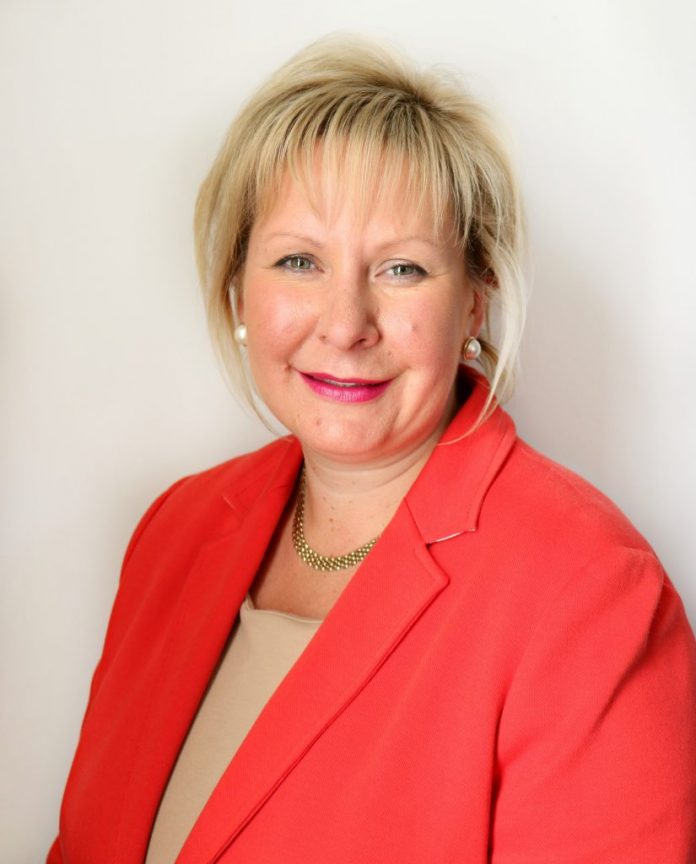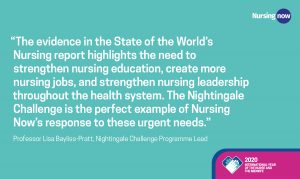
Professor Lisa Bayliss-Pratt, Programme Lead for the Nightingale Challenge
Nursing is a deeply human experience. Through their experience, nurses are the bridge between a patient and the system, and by enabling nurses to practice to the top of their licence, we can help to improve health systems globally.
Health is a multidimensional matter, and accordingly, care must be holistic. No-one is better suited to design this holistic approach to healthcare than nurses. The holistic, problem-solving insight of a nurse is increasingly necessary to ensure access to health for everyone, everywhere, and yet despite representing such a large proportion of the health workforce and playing an integral part in the patient experience, the voice of the nursing profession has, until now, been largely unheard. This voice and perspective are vital for change. We know that knowledge is not limited to facts, it is the information in between the medicines and the systems; it is knowing the patient, their background and applying science and compassion. Today we are undoubtedly on the precipice of seismic change, brought about by the challenges of COVID-19, but also a change brought about by the development of the nursing profession over the years.

Today, the World Health Organization, along with the International Council of Nurses and Nursing Now, launched the first-ever State of the World’s Nursing report. This report will serve as a valuable advocacy tool for years to come, providing data to understand and benchmark the huge value of investing and empowering nurses to improve health globally. Using this data to initiate dialogue, key decision-making will support change, and The State of the World’s Nursing report provides this marker in the sand to measure our progress. We need to make use of this data to work on the dialogue already started for the nurse leaders in the surgery, in the hospital and in the community. We need to elevate the role of nurses and share this change widely so that nurses can remake the norms of the profession.
Since June 2019, the Nightingale Challenge has driven a global movement to engage nurses and midwives around the world in leadership development programmes. The Nightingale Challenge is a global initiative for nurses to increase their confidence in existing and new leadership skills through challenging employers to provide a collaborative, enabling space for them to develop and grow. The Challenge asks employers, and the nursing and midwifery profession to take the young nursing and midwifery workforce seriously by investing in their early years career development. With this support and training, early career nurses and midwives are able to develop their leadership, advocacy and nursing practice knowledge and skills, while also building their confidence and capability. With an ever-growing demand and innovation needed in health service provision, these skills will be increasingly required by all health-workers, especially nurses and midwives who are often the most frequent point of access to health for many. The Nightingale Challenge has been a key driver in the change we are seeing within nursing, enabling nurses and midwives to take their place as leaders, practitioners, and advocates in health.
Armed with the data from the State of the World’s Nursing report and supported by the Nightingale Challenge, we will now be able to change, measure, and witness the evolution of the nursing profession as we claim our place as recognised leaders in healthcare, from the bedside to the policy-making table.
The Nightingale Challenge will continue to engage with employers of nurses and midwives around the world in this, the Year of the Nurse and the Midwife with the aim of creating a sustainable model to ensure the continued collaboration and education of nurses and midwives. It is also essential that we educate others, that we continue to challenge out-dated perceptions of nursing and midwifery and that we promote the holistic value of the nurse and midwife, reappropriating these roles not only as care givers but as care designers.


